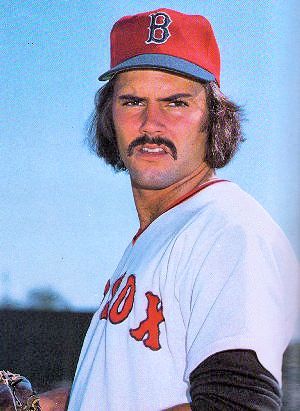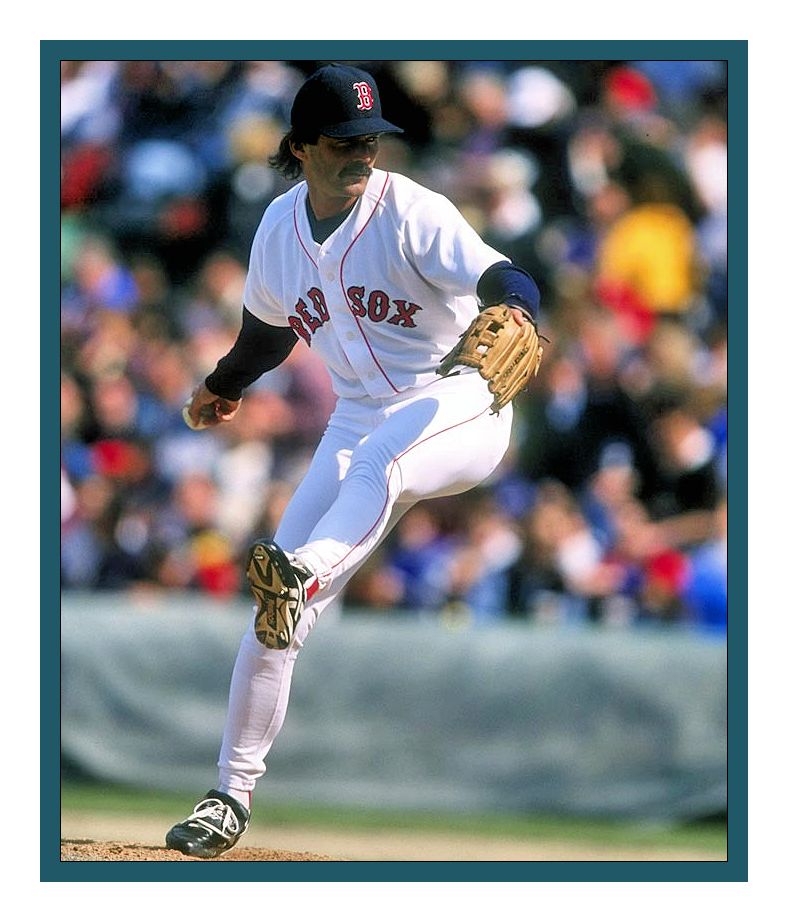|
“FENWAY'S BEST PLAYERS”  |
|||||
On March 30, 1978, the Cleveland Indians traded Dennis Eckersley to the Red Sox for four players. In coming to Boston, he went from a perennial second division club to a contender. On May 4th, Eckersley enjoyed his first Red Sox win against Detroit. He pitched his second complete game against the Royals and won his third straight game, beating the Twins. His fourth and fifth consecutive wins came against Toronto, away and home at the end of May. He then beat the Yankees on three consecutive starts to give the Red Sox an 8 1/2 game lead in the AL East on July 3rd. Two more wins boosted his record to 11-2 after the All-Star break. On August 25th, his four-hit shutout, beat the Angels, 6 to 0. Five days later he beat the Jays, making his record 16-5 and 9-0 at Fenway. More importantly, the Red Sox comfortably had a seven-game lead over the Yankees heading into September. But then the Sox went on a 3-14 skid, lost their lead, and ended up trailing New York two weeks later. "Eck" proved he was the "stopper" on September 17th, by pitching a strong game and registering his 17th win, beating the Yankees 7 to 3. The win left the Sox just 2 1/2 games behind them, but they had blown 17 1/2 games in two months. On September 21st, Eckersley scattered six hits winning in Detroit, and then shut out the Tigers in the opening game at Fenway, putting the Red Sox just one game out. On the second to last day, he won his 20th game of the season, limiting the Jays to five hits, but the Yankees kept the Sox behind them, by beating Cleveland and keeping their one game lead. On the final day of the season, Luis Tiant beat the Jays and the Yankees lost, to force the legendary "Buck Dent" one game playoff. The Sox had put together a hot streak of 12-2, winning their last eight in a row to catch them. Eckersley lived up to his “Number 1 Starter” billing by posting a 20-8 record with a 2.99 ERA. Nine of his victories came after a Red Sox loss, each time giving the Sox a victory when they needed it. And down the stretch, he had won four straight games. He posted 17 wins in 1979 and from July 11th to August 14th, he won eight straight games, with the first seven of those being complete game victories. But he developed a sore arm and won only one game the rest of the year. The soreness never did subside and he also developed back and shoulder injuries over the next few years. Eckersley still pitched well on occasion. In 1980, on June 23rd, the Sox knocked around Ron Guidry and he finished with a strong six-hitter, winning 7 to 2. He had been 3-0, with a 1.20 ERA in his last four starts. In Chicago, he surrendered only two hits and retired 16 batters in a row, on August 17th. Then he threw a one-hitter at Toronto on September 26th, giving up a solo home run for their only hit in a 3-1 win. His 12 wins led the Sox pitchers at year's end with a 4.28 ERA. The following year, in 1981, Eckersley finished the season with a mediocre 9-8 record and a 4.27 ERA. He pitched one of his best games on May 21st, allowing just two hits in a complete game shutout over the A's before the players went on strike. When the season resumed, he threw a four-hitter at the Indians for a 4-0 victory on June 2nd. In 1982, Eckersley was having a great bounce-back year. At the end of May, he could have been 8-0. His losses were by scores of 1-0, 2-0, and 3-0, and his ERA was 2.11. He had six of Sox ten complete games and three of the staff's six shutouts. He struck out a season-high 11 batters against the Twins, on May 12th. In Detroit on June 29th, he made it look easy with a 79-pitch performance that gave the Sox a 4-2 victory. Of the 79 pitches, 59 were strikes. But in August, he pulled the bicep muscle in his pitching arm and finished the season at 13-13, with a 3.73 ERA. In 1983, Eckersley's career seemed to be falling apart as he struggled to a 9-13 record and his ERA soared to 5.61. Giving up home runs plagued him. Not counting the strike-shortened season of 1981, he surrendered 142 round-trippers in five full seasons with the Red Sox. The Chicago Cubs found themselves looking for help in 1984, and on May 25th they dealt first baseman Bill Buckner to the Red Sox for Eckersley. The Cubs won the National League’s Eastern Division and Eckersley was later traded to Oakland before the start of the 1987 season. There he found his niche. Tony LaRussa carved out a role that was tailor-made for his personality, aggressiveness, competitiveness and intensity. Eckersley was given the closer role and proceeded to flourish, putting him on the road to Cooperstown. He pitched for another 12 years and finished his career in 1998, pitching one last season, again for the Red Sox. On September 26th, he broke Hoyt Wilhelm's major league record with his 1,071th career pitching appearance. His 390 career saves ranked him sixth on the all-time list and was inducted into the Hall of Fame in 2004. After his pitching career ended, Eckersley did not move far from the game that he loved. For the Red Sox, he became a studio analyst before joining Jerry Remy and Dave O'Brien in the booth, giving his "Eck-like" commentary and his blunt observations. Following the 2022 season, Dennis Eckersley retired as a Red Sox broadcaster after 20 years, to spend time with his family in California.
|
|||||

